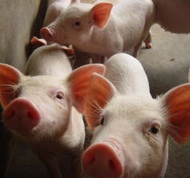
Pig industry working on PEDv contingency plan
Steps are being taken to boost the UK's defences to certain exotic and emerging diseases that could cause serious harm to the pig industry.
A contingency plan is being developed should porcine epidemic virus (PEDv) ever enter the country.
A number of other recommendations have been made by a round table under the auspices of the Pig Health and Welfare Council, and are being developed by industry partners.
PEDv is spreading across North America at a devastating pace, while African swine fever is moving west out of Russia. The risk facing the pig industry is at its highest peak since 2001, according to BPEX, a division of the Agriculture and Horticulture Development Board.
In a progress report published last week, it was revealed that the National Pig Association (NPA) has updated biosecurity protocols for the import of live pigs, semen and embryos to include risk management measures for PEDv and swine deltacoronavirus.
The NPA also led a review of current biosecurity resources for farms, abattoirs, transport, feed and live imports. In addition, discussions are being held on biosecurity measures for fallen stock industry contractors.
To encourage more samples to be sent in for PED testing, BPEX says it will now offer free testing of intestinal contents of pigs of all ages from outbreaks of diarrhoea in England and Wales.
BPEX veterinary advisor Derek Armstrong commented: "This work is being carried out by AHVLA and the results will be passed back to the pig unit’s veterinary practice."
Three biosecurity seminars will also be held this month for those across the supply chain. Delegates will benefit from hearing the experiences of an American producer who has had to battle PEDv.
Click here for the full list of recommendations and the progress report: http://www.bpex.org.uk/R-and-D/Pig-Health/diseases.aspx



 The Animal and Plant Health Agency (APHA) has updated its online reporting service for dead wild birds.
The Animal and Plant Health Agency (APHA) has updated its online reporting service for dead wild birds.